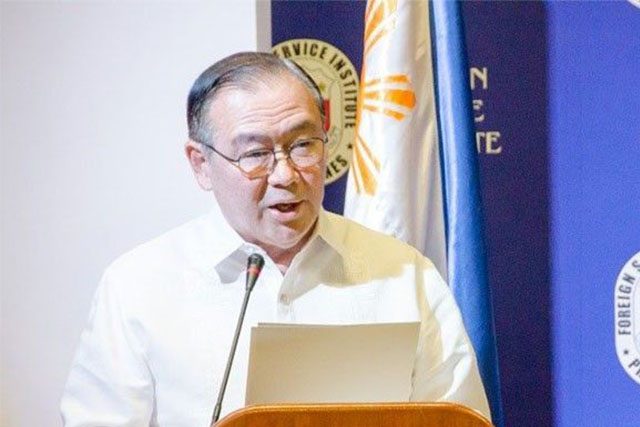
Foreign Affairs Secretary Teodoro Locsin Jr. apologized to the community of people afflicted with the human immunodeficiency virus (HIV) after he tweeted that being infected with it is “embarrassing” than having a novel coronavirus.
The top diplomat retweeted a post of HIV advocate group The Red Whistle that called on him to “reflect on his words and publicly apologize” to Filipinos living with HIV after his offensive remark.
“My apologies to the community for any offense I may have caused in stating my support for loosening of data privacy for contact tracing efforts. Rest assured that I am one with you all in destigmatizing HIV in society,” Locsin tweeted.
He previously shared a news item that reported on the justice department’s support to the Integrated Bar of the Philippines and two medical associations’ calls to lift the confidentiality of COVID-19 patients’ medical data to hasten contract tracing.
“Unlike HIV, there is nothing embarrassing about having your medical records made public for coronavirus. There’s a difference and it’s a big one: no privacy for Covid case,” Locsin commented in a now-deleted tweet.
It caught the attention of some Filipinos, including social media personality Mark Averilla or “Macoy Dubs.”
“Walang sinuman ang pwedeng ma-discriminate dahil sa HIV kahit panahon o hindi panahon ng pandemic. Remember that. Lalo ka na, Sir @teddyboylocsin,” he said.
The Red Whistle also released a statement on Locsin’s tweet which they described as “stigmatizing.”
“Having HIV should not be an embarrassment. But unfortunately, people living with HIV are subjected to undue stigma brought about by the general public’s lack of awareness and education on HIV prevention and treatment,” the group said.
“It is the duty of government to help improve Filipinos’ knowledge, awareness, and attitudes toward HIV,” it continued.
FULL STATEMENT OF THE RED WHISTLE ON THE STIGMATIZING TWEET OF THE SECRETARY OF FOREIGN AFFAIRS (@teddyboylocsin) ON APRIL 6, 2020: pic.twitter.com/mLNRD7jsWD
— The Red Whistle ⛑ #SaveSexy (@TheRedWhistle) April 6, 2020
The advocacy group added that Republic Act 11166 or the Philippine HIV Policy Act of 2018 prohibits individuals affiliated with HIV from being bullied in all forms, “including bullying in social media and other online portals.”
Violators can be jailed for up to five months and/or be penalized from P50,000 to P500,000.
RELATED: Advocates of new HIV-AIDS law hope to end stigma among Filipinos
“We enjoin the Secretary of Foreign Affairs (@teddyboylocsin) to reflect on his words and publicly apologize to the tens of thousands of Filipinos living with HIV at home and abroad that he may have offended,” The Red Whistle previously said.
The Research Insitute for Tropical Medicine has temporarily suspended the HIV drug testing and viral load testing services “until further notice.” The decision was made as it refocuses its available manpower and resources to augment the needs of the ongoing COVID-19 response.
RITM is one of the health facilities where specimens of persons under monitoring and under investigation of COVID-19 infection are brought for detection.
Notes on HIV
HIV is a virus that targets the immune system and weakens an individual’s defense systems against infections and some types of cancer. It is transmitted through the exchange of bodily fluids from infected people, among others.
The World Health Organization reported that HIV “continues to be a major global public health issue” which has claimed “more than 32 million lives so far.”
In the Philippines, the Department of Health said that there was an increase in the daily number of reported HIV cases based on the Epidemiology Bureau‘s registry in August 2019.
The Human Rights Watch in 2018 reported that there are still people in the country who experience discrimination when it comes to HIV.
The United States’ Center for Disease Control and Prevention noted that discrimination against HIV can prompt afflicted people “to develop a negative self-image.”
“HIV internalized stigma can lead to feelings of shame, fear of disclosure, isolation, and despair. These feelings can keep people from getting tested and treated for HIV,” it said.









